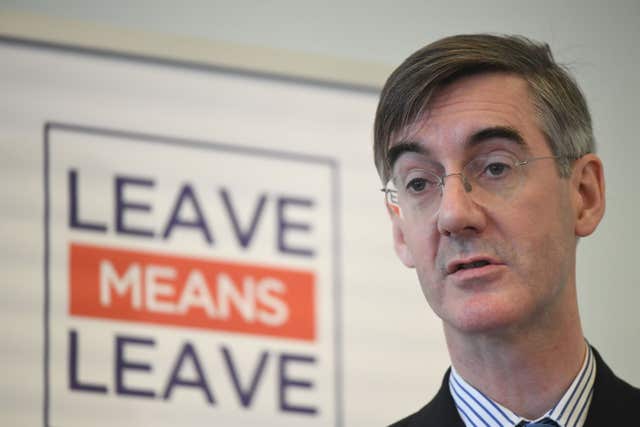
The influential Commons Brexit committee has called on the Government to consider negotiating continued membership of the European Economic Area (EEA) or joining the European Free Trade Association (EFTA) after Brexit.
Brexit Secretary David Davis has previously ruled out both options, calling them “in many ways, the worst of all outcomes.”
However the cross-party committee, in its report on the future UK-EU relationship, recommended that if negotiations on a “deep and special partnership” proved unsuccessful, EEA/EFTA membership should “remain an alternative”.
The recommendation caused splits in the committee, with prominent Tory Brexiteers led by Jacob Rees-Mogg voting against its inclusion.
The committee’s Brexiteers also voted against the report in its entirety, but were defeated 10-6.
 Conservative MP Jacob Rees-Mogg voted against the report
Conservative MP Jacob Rees-Mogg voted against the report
Mr Rees-Mogg told the Press Association the report served “no useful purpose”, adding: “The ExEU Select Committee report is another effort by Remainers to reverse the result. The High Priests of Remain on the select committee voted to thwart Brexit by stealth.
“This serves no useful purpose as select committees’ reports are only influential if they are unanimous, dividing on leave/remain lines simply refights the referendum.”
In addition to the recommendation, the committee also set down 15 “key tests” for the Government’s final deal with the EU to pass.
The guidelines covered everything from the Northern Ireland border issue to the free flow of data between the UK and EU post Brexit.
Labour chairman of the committee Hilary Benn admitted to setting “a high bar” with the tests, but added that they were based on the past pledges of the Prime Minister and the Brexit Secretary.
He said: “Our tests set a high bar but they are based on the Prime Minister’s vision for our future outside the EU and the statement by the Secretary of State for Exiting the European Union, David Davis MP, that any new deal would be at least as good as what we have now.
“It is vital that UK businesses are able to continue to trade freely and sell services into our largest market after we leave, without additional costs or burdens or a hard border in Northern Ireland and that we maintain close co-operation on defence, security, data and information sharing and consumer safety.”
He added: “Should negotiations on a ‘deep and special partnership’ not prove successful, we consider that EFTA/EEA membership remains an alternative which would have the advantage of continuity of access for UK services and could also be negotiated relatively quickly.”
The committee’s tests included keeping an open border between Northern Ireland and the Republic of Ireland, co-operation on crime and terrorism and tariff free trade between the UK and EU.
The report also calls on the Government to maintain convergence with EU regulations in “order to maximise access to European markets” and advises that any new immigration arrangements “must not act as an impediment to the movement of workers providing services across borders”.
A Department for Exiting the European Union spokesman said: “As the Prime Minister said at Mansion House, the UK Government is seeking the broadest and deepest possible partnership with the EU, covering more sectors and co-operating more fully than any free trade agreement anywhere in the world today.
“When we leave the EU we will leave the single market and customs union so that we take back control of our money, laws and borders.
“To do otherwise will see us forever implementing, in their entirety, new EU legislation over which we will have had no say, and leave us with less control over our trade policy than we have now.”


Why are you making commenting on The Herald only available to subscribers?
It should have been a safe space for informed debate, somewhere for readers to discuss issues around the biggest stories of the day, but all too often the below the line comments on most websites have become bogged down by off-topic discussions and abuse.
heraldscotland.com is tackling this problem by allowing only subscribers to comment.
We are doing this to improve the experience for our loyal readers and we believe it will reduce the ability of trolls and troublemakers, who occasionally find their way onto our site, to abuse our journalists and readers. We also hope it will help the comments section fulfil its promise as a part of Scotland's conversation with itself.
We are lucky at The Herald. We are read by an informed, educated readership who can add their knowledge and insights to our stories.
That is invaluable.
We are making the subscriber-only change to support our valued readers, who tell us they don't want the site cluttered up with irrelevant comments, untruths and abuse.
In the past, the journalist’s job was to collect and distribute information to the audience. Technology means that readers can shape a discussion. We look forward to hearing from you on heraldscotland.com
Comments & Moderation
Readers’ comments: You are personally liable for the content of any comments you upload to this website, so please act responsibly. We do not pre-moderate or monitor readers’ comments appearing on our websites, but we do post-moderate in response to complaints we receive or otherwise when a potential problem comes to our attention. You can make a complaint by using the ‘report this post’ link . We may then apply our discretion under the user terms to amend or delete comments.
Post moderation is undertaken full-time 9am-6pm on weekdays, and on a part-time basis outwith those hours.
Read the rules hereLast Updated:
Report this comment Cancel